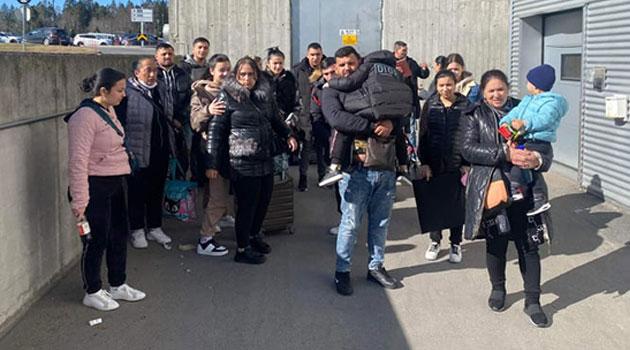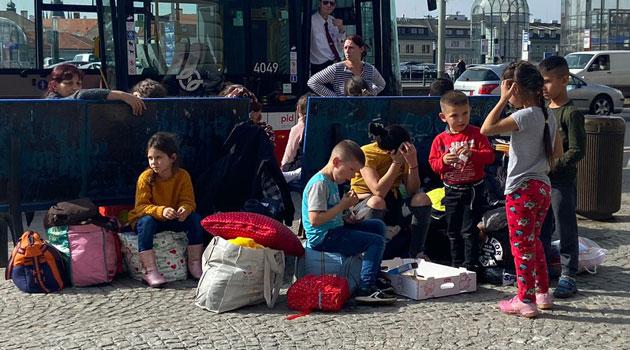Czech and Romani activists aid hundreds of Romani refugee Ukrainians with traveling on to countries that are less discriminatory and racist

Several hundred Romani refugees from Ukraine who ended up in the Czech Republic have been helped by the Konexe organization with getting out of the country as soon as possible. According to activist Miroslav Brož of Konexe, Romani Ukrainian refugees encounter discrimination and racism in the Czech Republic and it is better for them to travel to Germany, Ireland or Norway instead.
“We know from practice what a huge problem it is to find decent housing in the Czech Republic, at a normal price, outside the ghetto, for the Czech citizens who speak Czech and who are ethnic Roma, what the attitudes of the majority of the population here towards Romani families are. That is why we have focused on helping the Romani refugees who do not want to stay in the Czech Republic, but who want to travel further west, to a country with a lower level of antigypsyism and better opportunities,” Brož said in an interview with Romea.cz.
Q: How has Konexe been involved with aiding Romani Ukrainians fleeing Russia’s war?
A: We began helping Romani refugees as soon as they showed up. In the first days after the start of the Russian attack on Ukraine, Jožka Miker went with Mr. Emil Voráč to the Slovak-Ukrainian border, where they not only delivered aid, but mainly conducted a survey of the situation on the spot.
Q: What did they find there?
A: Already at that point we recorded information about how Romani refugees are being discriminated against and segregated while they are on the run from the war. They are pushed to the back of each line, they are separated from non-Romani refugees by those who offer accommodation or transport. It was clear to us that these things would continue even after they arrived in the Czech Republic. In this wonderful wave of solidarity, we knew Romani refugees would be an exception and would not be as welcome as other refugees.
Q: Is that why you decided to help Romani refugees travel further west?
A: We know from practice what a huge problem it is to find decent housing in the Czech Republic, at a normal price, outside the ghetto, for the Czech citizens who speak Czech and who are ethnic Roma, what the attitudes of the majority of the population here towards Romani families are. That is why we have focused on helping the Romani refugees who do not want to stay in the Czech Republic, but who want to travel further west, to a country with a lower level of antigypsyism and better opportunities. I have spent days reaching out to all the contacts that Konexe has in Germany and other European countries that are open to helping refugees from the war. We asked all of them whether they could find accommodation and accept a group of Romani Ukrainian refugees.
Q: What does that aid specifically entail?
A: I guess the model for our work that has emerged over the last few weeks is as follows: During the day somebody would call us, for example, from Initiativa Hlavák [Main Station Initiative in Prague], or from some non-profit organization saying that they have a group, typically of 10-20 Romani Ukrainian refugees, who want to travel to Germany. We would call our German partners and then instruct the group to go to Hamburg, for example, where people from a friendly organization would be waiting for them on the platform, would take them to their accommodation and help them with registration in the asylum process and with interpretation into Romanes during the following days, etc. In the beginning, we attempted to organize a trip for one group per day, but later we became overwhelmed, there were many groups. In total, we have helped slightly more than 300 refugees on their way to Germany, the largest single group we helped had 40 people in it.
Q: Have you helped Romani refugees leave the Czech Republic for other countries besides Germany?
A: In addition to Germany, we managed to help a group of 25 Romani Ukrainian refugees find asylum and safety in Norway, where our Norwegian partner picked them up at the airport. We would like to continue helping people to relocate there, but in the case of air travel, we are limited because we do not have the money for air tickets. We managed to pay for the flights for 25 Romani Ukrainian refugees to go to Oslo thanks to the kindness of Pastor Marek Gombár and thanks to the Romodrom organization, both of whom contributed. In addition, Mr. Gombár kindly took care of the refugees until their departure, with which he helped significantly. We thank him very much. At present we have a promise of CZK 50 000 [EUR 2 000] from a kind sponsor to buy tickets for 25 Romani Ukrainian refugees to fly to Dublin, Ireland. The Irish Republic is receiving and granting asylum to refugees from Ukraine, and we have a capable, strong partner organization in place there whom we know we can count on to help “our” refugees with all that will be necessary.
Q: Are you providing any other kind of aid? Here in the Czech Republic, for example?
A: On a daily basis we are also helping Romani Ukrainian refugees who are, how shall I put this, lost in Germany. Contact information for Konexe is probably circulating to all sorts of refugee or Romani groups through social media, which is good, of course. Almost every day we are being contacted by a Romani family who came on their own to a German city such as Leipzig, Nuremberg or elsewhere. They run out of money for gas, they don’t know the language, they don’t have food. We then find them a human rights organization or a Romani one, through our contacts or by searching in that city online, to go and find them and provide them with aid. Then there is our assistance in situations where things haven’t worked out yet for the refugees in the Czech Republic. It does happen that a church parish, or a family, or a non-profit signs up to accept refugees and is assigned Romani ones. This may not be what they anticipated, they were not expecting Romani Ukrainians, or the situation might be too demanding, the hosts may not have expected such a big family, or there simply may be big cultural differences between them and, despite enormous efforts made by both sides, it’s not possible to overcome the differences and the situation becomes quite challenging, both for hosts and for refugees. In such situations, we offer to aid the Romani refugees with traveling further west, that is the opportunity we can give them. Sometimes, however, after such an experience, these refugees travel back to Ukraine because they do not believe they will be granted asylum anywhere.
Q: At the moment you are expecting a group of Romani Ukrainian refugees to arrive from the area near Mariupol in Ukraine. How are you organizing that?
A: Some time ago, activists who are Romani Ukrainians, women, contacted us with a plan to leave their safe havens in the EU, return to Ukraine by bus, load up 50 Romani people from southeastern Ukraine, which is currently the front line, and bring them back to safety in Germany. Of course we agreed to aid them, for us it is a great honor to assist with such a plan. Through our partners we have helped find accommodation for them in Bremen and we anticipate the bus will arrive in Prague any day now, where they will take a break and the passengers will spend the night here before making the rest of the trip to northwestern Germany. I would like to thank everybody who is helping us with what we are doing.
